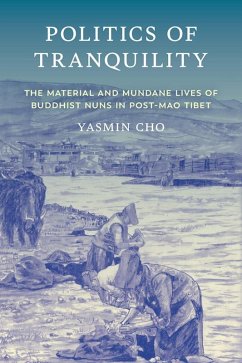
Politics of Tranquility (eBook, ePUB)
The Material and Mundane Lives of Buddhist Nuns in Post-Mao Tibet
Versandkostenfrei!
Sofort per Download lieferbar
15,95 €
inkl. MwSt.
Weitere Ausgaben:

PAYBACK Punkte
8 °P sammeln!
Politics of Tranquility concerns the Tibetan Buddhist revival in China, illustrating the lives of Tibetan Buddhist nuns and exploring the political effects that arise from their nonpolitical daily engagements in the remote, mega-sized Tibetan Buddhist encampment of Yachen Gar. Yasmin Cho's book challenges two assumptions about Tibetan Buddhist communities in China. First, against the assumption that a Buddhist monastic community is best understood in terms of its esoteric qualities, Cho focuses on the material and mundane daily practices that are indispensable to the existence and persistence ...
Politics of Tranquility concerns the Tibetan Buddhist revival in China, illustrating the lives of Tibetan Buddhist nuns and exploring the political effects that arise from their nonpolitical daily engagements in the remote, mega-sized Tibetan Buddhist encampment of Yachen Gar.
Yasmin Cho's book challenges two assumptions about Tibetan Buddhist communities in China. First, against the assumption that a Buddhist monastic community is best understood in terms of its esoteric qualities, Cho focuses on the material and mundane daily practices that are indispensable to the existence and persistence of such a community and shows how deeply gendered these practices are. Second, against the assumption that Tibetan politics toward the Chinese state is best understood as rebellious, incendiary, and centered upon Tibetan victimhood, the nuns demonstrate how it can be otherwise. Tibetan politics can be unassuming, calm, and self-contained and yet still have substantial political effects. As Politics of Tranquility shows, the nuns in Yachen Gar have called forth an alternative way of living and expressing themselves as Tibetans and as female monastics despite a repressive context.
Yasmin Cho's book challenges two assumptions about Tibetan Buddhist communities in China. First, against the assumption that a Buddhist monastic community is best understood in terms of its esoteric qualities, Cho focuses on the material and mundane daily practices that are indispensable to the existence and persistence of such a community and shows how deeply gendered these practices are. Second, against the assumption that Tibetan politics toward the Chinese state is best understood as rebellious, incendiary, and centered upon Tibetan victimhood, the nuns demonstrate how it can be otherwise. Tibetan politics can be unassuming, calm, and self-contained and yet still have substantial political effects. As Politics of Tranquility shows, the nuns in Yachen Gar have called forth an alternative way of living and expressing themselves as Tibetans and as female monastics despite a repressive context.
Dieser Download kann aus rechtlichen Gründen nur mit Rechnungsadresse in A, D ausgeliefert werden.













